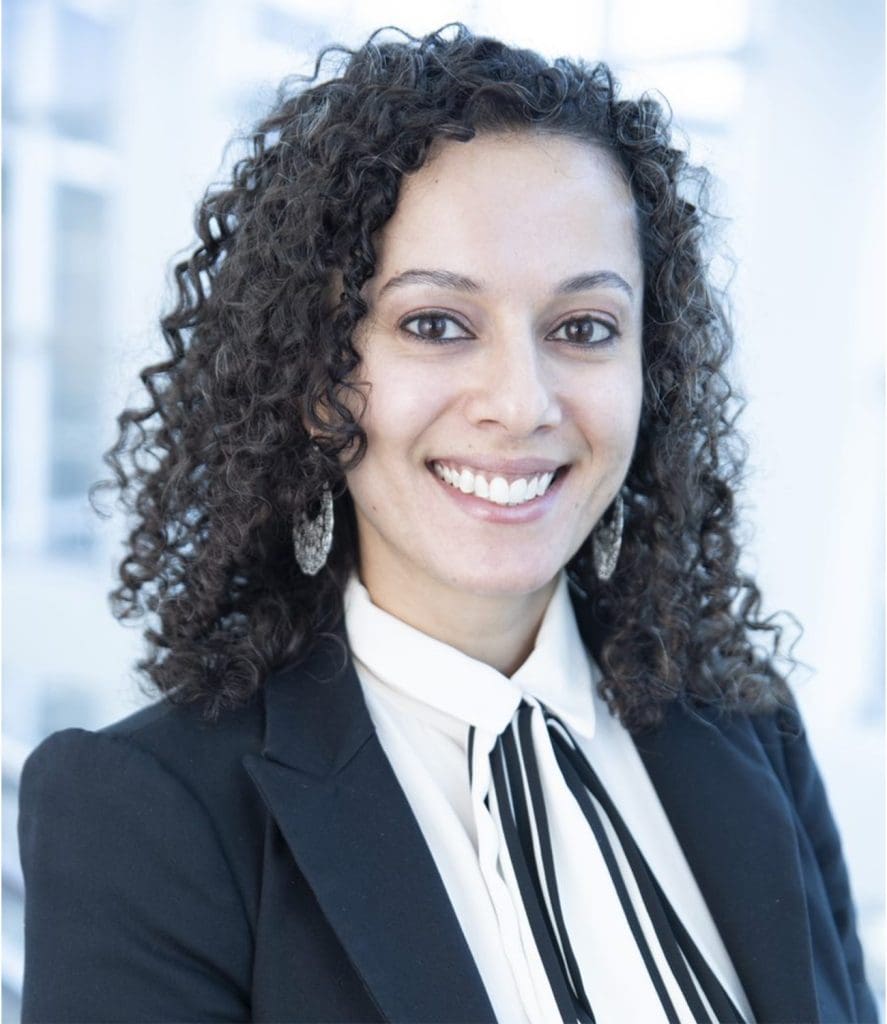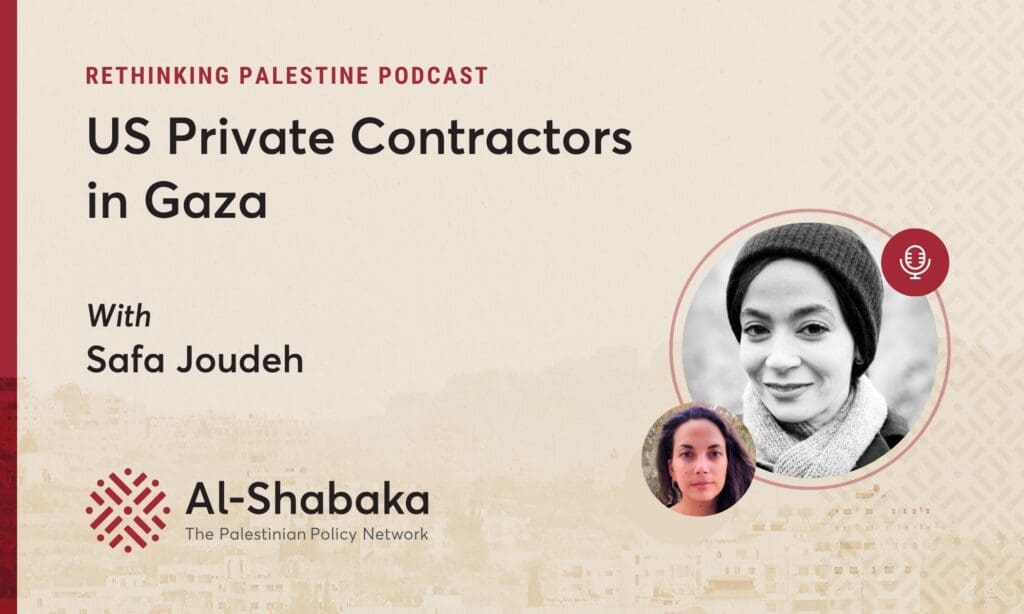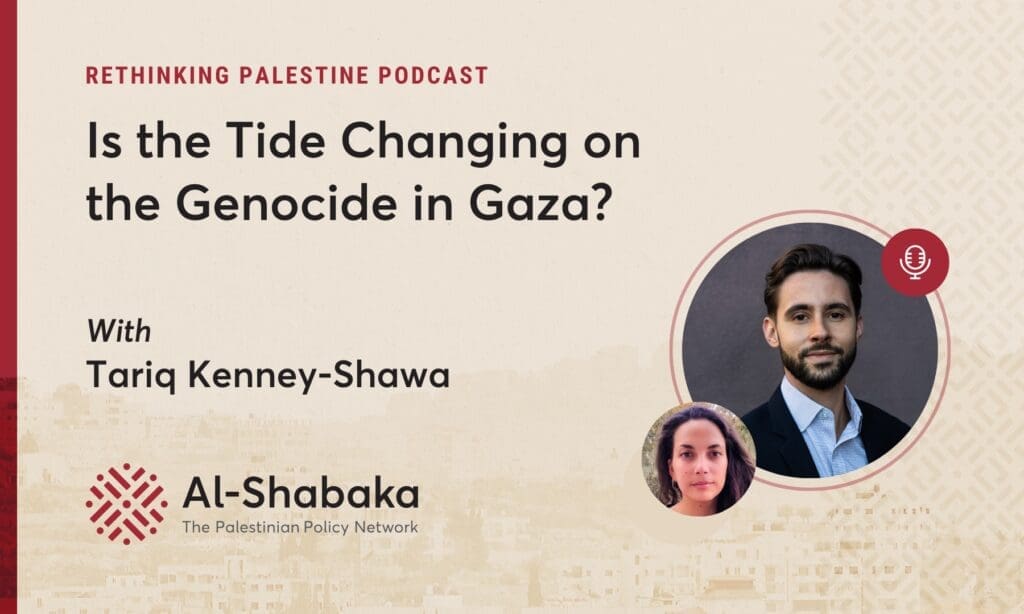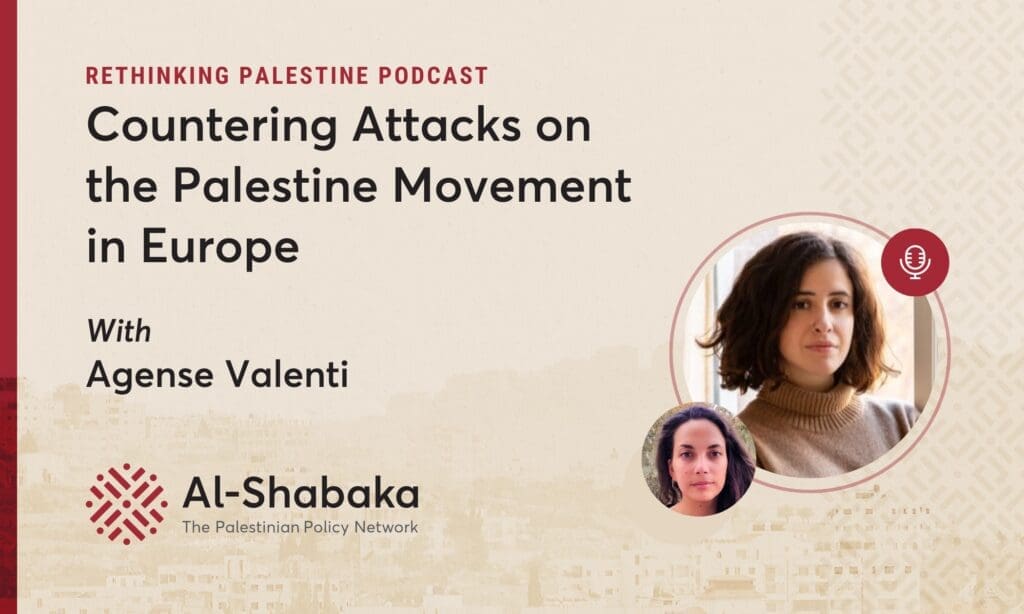About This Episode
Episode Transcript
The transcript below has been lightly edited for brevity and clarity.
Yara Asi 0:00
The question for Palestinians becomes, do we reject this paradigm? Do we use every lever to push for liberation? Even if we lose some of what so many sacrificed so much for. Even if it means rejecting certain streams of financial support. Even if it means we have to completely rethink how we construct our economy and educational system and health system and push back against governmental actors that have proven they will retaliate.
Yara Hawari 0:33
This is Rethinking Palestine, a podcast from Al-Shabaka, the Palestinian policy network. We are a virtual think tank that aims to foster public debate on Palestinian human rights and self-determination. We draw upon the vast knowledge and experience of the Palestinian people, whether in Palestine or in exile, to put forward strong and diverse Palestinian policy voices. In this podcast, we will be bringing these voices to you so that you can listen to Palestinians sharing their analysis wherever you are in the world.
Yara Hawari 1:07
In December 2021, Al-Shabaka published a policy brief entitled “A Vision for Liberation: Palestinian-led Development in Health and Education” by Dr. Yara Asi, assistant professor at the University of Central Florida and the previous US visiting fellow for Al-Shabaka. In it, Dr. Asi discusses how the Palestinian health and education sectors in the West Bank and Gaza have been neglected by the Palestinian Authorities and the donor community for decades.
Indeed, the security sector consumes more of the PA’s budget than the health, education, and agricultural sectors combined. And yet both health and education are fundamental human needs and rights and a population that is both healthy and has access to education is more able and better poised to develop a movement for liberation.
Based on qualitative interviews with scholars, activists, teachers, engineers, lawyers, doctors, shopkeepers, construction workers, and students across colonized Palestine, and in the diaspora, Dr. Asi attempts to address what a Palestinian vision for development that will bring about liberation and free Palestinians of donor imposed conditions and restrictions would look like. Dr. Asi, thank you so much for joining me on Rethinking Palestine.
Yara Asi 2:19
Hi Yara. Thanks for having me.
Yara Hawari 2:21
Firstly, can you lay out briefly the current state of the health and education sectors in the West Bank and Gaza? And what are the reasons for that state?
Yara Asi 2:29
So I think this is a really important place to start this conversation. So what’s interesting about these sectors is that both have demonstrated quantitative improvement in the recent decades, undeniably, like much of the Middle East, although there are very few longitudinal statistics from before the Oslo period in the mid 1990s. Unfortunately, what we do have shows on the surface good news. So you had a life expectancy of just about 68 years old in 1990. Today, it’s closer to 74 years. You had a literacy rate near 90% just decades ago. Now it’s closer to 98% for adults and youth, boys and girls. You have immunization rates for the standard vaccines, like measles, polio, rebella at nearly 100%.
So on these basic measures, Palestine, and again, here, we’re referring to the West Bank and Gaza Strip are doing quite well, actually outperforming many countries with similar economic indicators and definitely outperforming other conflict-affected countries. You’d think of Yemen or Syria, for example.
This is in large part a result of this massive influx of aid from the West since the Oslo Accords. But it’s also representative of the fact that due to centuries of colonialism, Palestine was greatly underdeveloped beforehand even by the standards of the region. So all of the region was colonized essentially at the turn of the 20th century, but by the early to mid 1900s, many of the countries in the Arab world that we recognize today were establishing themselves.
At that same time, however, Palestinians had experienced the Nakba of course in 1948. And then the beginning of this violent and restrictive military occupation and this ongoing settler colonial project. To the Ottomans and the British, Palestinian health and education were not necessarily priorities.
To the extent to which they didn’t affect their own local populations that were there. So health was largely left to local healers or to doctors who trained elsewhere and returned to Palestine. Whereas education was mostly primary education and even then, mostly for boys. If you wanted to go to university, you’re having to go to Syria or Turkey, most likely.
So many Palestinian institutions started to develop in the mid-20th century in the absence of a state, not in the development of one. So when you look at the system today, you have this foundation of this largely neglected structure, you have this underserved fragmented and oppressed population.
And then on top of that shaky foundation is this hastily built system, which was given a lot of attention and advice and money from all these outside actors that had very political motivations and they wanted a lot of good outcomes quickly. So they’re not necessarily thinking about what is best for the Palestinians in these territories in the long term.
And as part of that, they purposefully ignored and continue to ignore the fundamental causes of the conflict and the continuing violations. Then you have Palestinian governance who has never really grappled with the responsibility of governance and advocacy. Highly corrupt, highly authoritarian but there was just enough aid to build schools and hospitals and pave roads.
And so when you look at these standard measures of development, there’s a lot of positives. There’s a lot of check marks here. But just beneath the surface, there are a lot of issues. And when you start to look at the quality and accessibility of these sectors, and especially when you see how disconnected they’ve become from the populations they’re serving, you realize that these are not sustainable systems and they were never meant to be.
Yara Hawari 6:07
Obviously, the pandemic highlighted to a mainstream audience, many of the deficiencies of the Palestinian health sector in the West Bank and Gaza. What in particular stood out for you?
Yara Asi 6:18
Yes, absolutely. So, you know, I, and many others wrote about how the pandemic kind of exposed this governance limbo, I guess, that Palestinians are in, especially when it comes for who is responsible for them in a crisis. And for any listeners who want more detail about that specifically, I wrote a piece for Al-Shabaka in November 2020 about the pandemic.
Although the pandemic was uniquely disruptive, I mean for all of us right, it also presented a unique opportunity, as you said, for the rest of the world to have even a brief understanding of what Palestinians experience regularly. So you have Israel on the one hand, perfectly comfortable with abdicating its role as an occupying power, because it does not see itself that way.
And then the Palestinian government which has spent so much time and money formalizing itself without actually advocating for the power that it would need to resemble anything like a sovereign government. I mean, remember we know they still don’t control their own borders. They’re not allowed to build an airport. They don’t even control the movement of their own residents. This is not an environment where a health system can thrive. On top of that, you have this economy that’s been strangled for years. And so that has greatly limited what the state is willing to spend on health. They spend this outsized money on security.
So you have this medical sector that is under-resourced. And I mean, I’m talking in terms of Gaza, even on basic goods, like IV bags and gauze. You have a population that can’t move freely, even for emergency medical care. In some cases you see literally ambulances blocked at checkpoints. You have a population that is fragmented, such that Palestinians from Gaza can’t even access care in the West Bank or East Jerusalem without Israeli-issued permits.
I had an interviewee who was a retired physician that worked in Nablus and he was very anxious about the future of the medical sector, because they’re simply not training enough people to replace this current generation of doctors and especially specialists. And the problem with this is this only further pushes Palestinians to leave the territories, to receive either medical education or training.
In which case you wonder how many of them will come back or to receive medical care, which, you know, as a result of this arbitrary medical permit system, not everyone who needs the care can get it. And many of my interviews argued that this de-development and this fragmentation in these vital life sectors like health are wholly intentional and are meant to disconnect Palestinians from Palestine or whatever Palestine could be.
Yara Hawari 8:54
So sticking with the health sector, Yara, you discussed the resurgence of this discussion around decolonizing global health and that an interviewee even suggested that Palestine could serve as a model for that movement. What does it mean to decolonize health sectors? And what could steps towards that look like in Palestine?
Yara Asi 9:13
So in the global health literature, I would say for the past two or three years especially, there has been this increase in call for decolonization in global health. So what does this mean? So this is an ongoing and emerging conversation. There are multiple definitions of exactly what this means, depending on who you ask, where they live, and what their job is.
So if you ask someone from the global north who is in a university, they will have a different answer than a community health worker from the global south, for example. So talking about that specifically could take up an entire podcast. So I recommend your listeners look into some of the really interesting scholarship and debates that have come out in recent years about decolonization and health.
However, at its core, decolonization is about disrupting power, about identifying and removing forms of supremacy, about in many cases like Palestine, literally dismantling colonial structures and legacies. So as you can imagine, this is a large and decentralized project. There’s no leader for this.
This is, at this point, really a bunch of academics and practitioners having conversations among themselves about what this could look like. Some even hesitate to call it a project or a movement. The problem with these ideas as discussed today is that they still largely stem from the global north about the global south.
And many of these discussions exclude the very people they claim to want to support and liberate. You see this, especially in this humanitarian aid model that’s imposed on Palestinians. Well, we’re just trying to help you. We’re helping you. How could that be bad? Right. So Palestine is unfortunately a perfect microcosm of this.
Palestinians are rarely seen as the best arbiters of what Palestinians want or need. They’re rarely even trusted as witnesses of their own experiences. They’re constantly questioned. They’re seen as biased. They’re seen as perhaps even in some circles, uncivilized and un-understanding of the realities of the world, so to speak.
So decolonization in this sense involves centering Palestinians and Palestinian voices. Embracing indigenous health. So, you know, the health system in Palestine and in many health systems that were created by donors essentially were built to resemble the health systems that the donors themselves had. These kinds of very neoliberal, very capitalist, very individualistic models of health.
And decolonization would involve almost a radical transformation of a health system that serves its population and not the entities that have paid for it for decades. It is Palestinians shaping their own narrative, identifying their own needs and going forth to pursue them without needing the permission or approval of external actors. So it’s not a short-term project. But then again, none of this is.
Yara Hawari 12:09
If you are enjoying this podcast, please visit our website www.al-shabaka.org where you’ll find more Palestinian policy analysis and where you can join our mailing list and donate to support our work.
So let’s switch gears and look at the education sector, which you described as lacking vision. What exactly do you mean by that? And talk to me about the particular challenges that are coming from the donor community.
Yara Asi 12:36
Yeah. So talk about a white savior complex, right? I would say in my interviews for this Al-Shabaka brief, some of the most interesting and philosophical conversations I had were about education, because education is so important in Palestinian communities, in Palestinian households, you know, it is seen as such an important thing to hold in a family to get a better life, to increase your station in life. And yet what the interviewees wanted to talk about was first let’s reflect on what the value of education is. What is the purpose of education?
I think most of us would agree that skill training for employment is definitely part of it, but it’s definitely not all of it, or at least it shouldn’t be. There is a deeper purpose, especially when you have a population that is experiencing this collective trauma in a world, essentially blind to their daily experiences. Education is a connection from the present to the past. It is this opportunity, a rare opportunity, for self-reflection and community reflection on lived reality. At its best education awakens the student from being limited to what they merely witness in their own lives and connects them to the wisdom and experiences and history that they otherwise have little opportunity to explore.
Again, this was emphasized by so many of my interviewees. Education in Palestine should look nothing like education elsewhere because Palestine is like nowhere else, facing challenges few populations have to face. So education and especially primary education is the best opportunity to reach youth who are still energetic and engaged and have fresh and new ideas.
It is the best opportunity to teach them critical thinking skills. And again, going back to history and about genuine collaboration and how to build something sustainable and meaningful, regardless of whatever their job is. And all of this sounds so great, right? But most of that is not the donor’s priority.
And even if it was, unless they engage meaningfully with local staff and allow local curriculum development, they’re not going to be able to do it adequately anyway. And that’s the problem. Donors are not concerned with vision because that’s not quantifiable. That doesn’t make Palestinians good workers.
And that’s what they are concerned with. I don’t say this to mean that many in the education humanitarian sector don’t have genuinely good intentions, but they have intentions imposed from the outside about what Palestinian development and especially education should look like. One of the ways donors have this outsized role is in textbooks. Because of fears of being charged with incitement or even antisemitism, donors have this really outsized interest in textbooks, especially in Palestinian primary schools and especially in UNRWA.
So I heard several anecdotes from interviewees about ways donors would request changes in books to appear more “balanced” when really they were insisting on erasing Palestinian narratives and Palestinian history.
So you have to think about what kind of education are Palestinians really being given and to what end.
Yara Hawari 15:54
Despite all the challenges and barriers that you identify there are of course still possibilities for internal transformations. What could some of these transformations look like?
Yara Asi: 16:04
You know, obviously, there were, as you say, there’s a lot of negative aspects of these conversations that can be kind of depressing, but I talked to almost 20 people and what I was really encouraged by was they have so many good ideas.
I mean, everyone brought different ideas to the table. Some people had ideas about how to reform education, how to incorporate more cultural education. So having dance troupes and olive picking events and kind of having this more holistic Palestinian approach to education. Some were more supportive of kind of exchange programs for Palestinian doctors, where they would train in specialties that aren’t currently available in Palestine.
But then the government would have some sort of incentive for them to come back and stay in Palestine. A lot of people who leave Palestine for stable work don’t necessarily want to leave. There’s just nothing for them to return. So a lot of people had ideas for incentives about guaranteed wages, guaranteed housing, you know, other ways that we could rethink, especially higher level jobs and education and health that would encourage young Palestinians to pursue them.
I think the most important thing that I gathered and the thing that I was most encouraged and motivated and inspired by was that there are so many ideas, especially with the younger people that I talked to. I mean, they are so plugged into what’s going on. There’s no surrender here. They have not given up.
They are not willing to acquiesce their future to, you know, they talk to their parents and grandparents and they’re kind of like, oh, nothing will change you know, I’ve seen this for decades, you know, the youth, they don’t embrace that. At least not yet. They’re not cynical yet. And so for me, it was wow, how much are we losing by not hearing these voices otherwise? Why aren’t these people being elevated? You know, people that have a tiny little NGO with just three or four people that are trying to change something in education or change something in their village or change something in the health sector.
We need to elevate these voices. They really exist. And that to me, instead of hearing resignation, instead of hearing just cynicism. I heard a lot of optimism and hope and they just wanted an opportunity to be able to explore it, try it, see if it works, if it doesn’t try something else, right? I mean, that’s part of the process. And so they just need the boot to be lifted off their neck so to speak.
Yara Hawari 18:37
Yara, thank you for sharing that piece of optimism, it’s always important to hear. And I want to end on a quote from one of your interviewees. They say: “Is the goal to create development and an economy around survival? Or is it to create an economy and development process aimed at liberation? If it is liberation, you have to know that you’re not going to be as economically comfortable.” Can you explain this to our listeners? What does that mean?
Yara Asi 19:02
Ah, yes. So this was a dilemma that I heard expressed from a lot of my respondents. And especially from those who don’t currently live in the occupied territory.
So those who like myself live in the diaspora, those who are forcibly exiled, or those who live behind the green line. The reality is things could hobble along as is for some undefined period of time into the future. Donors could keep providing just enough support to prevent, you know, any significant change in the, again, “status quo” from the Palestinian side. And you know, something, this paradigm has resulted in significant development over just a generation or two.
I mean, when I was young, visiting my mother’s village, not a single person had a car. If you needed to get to the city, you had to have arranged a taxi way ahead of time or get lucky and catch one that someone else had booked. Today in that same village, almost every household has at least one car.
They’re driving on newly paved roads and they can now drive to get sushi or pizza in Ramallah or Nablus, you know, assuming there’s no checkpoint. It’s a completely different experience. And on the surface, it mimics the lives of their peers in Jordan or Lebanon. The GDP of the West Bank and Gaza has increased nearly sixfold since 1994, but this is an artificial situation.
This so-called economic improvement is built as a house of cards. It is occurring in this context of increasing political strangulation from all sides. There’s no good endpoint for the trends we’re seeing in the home demolitions, the settler violence, this right-wing drift of Israeli politics and the impunity the rest of the world seems prepared to give to all of it.
So as that interviewee kind of boiled it down, the question for Palestinians becomes, do we reject this paradigm? Do we use every lever to push for liberation? Even if we lose some of what so many sacrificed so much for. Even if it means rejecting certain streams of financial support. Even if it means we have to completely rethink how we construct our economy and educational system and health system and push back against governmental actors that have proven they will retaliate against opposition. Do we embrace this collectivist effort that in the short term at least could cause real economic pain and hardship for some?
Or do we continue to work within the current paradigm? Try to find ways to make it work, work towards incremental change, try to leverage international relationships, try to find ways to individually prosper or at the very least survive and hope that at some point something changes on the outside.
You know, for these people that have been so oppressed and marginalized, is it fair to ask them to potentially give up on some economic comforts for this abstract goal of liberation that at the moment at least seems, you know, quite distant? While it certainly isn’t my place to answer that and that’s not what I was trying to do in the piece. Because these are large complex questions that need to be answered by a larger Palestinian movement that really considers the reality of the world today. But I do think that Palestinians and especially those in the occupied territories and their allies outside do need to start at least having these kinds of hard conversations.
Like what are we really pushing for? What is our next steps? So that we do have a vision for our next steps, for what we collectively want to move toward. So I hope this policy brief, you know, although there’s these tensions within it because it was so informed by Palestinians of such varying backgrounds, I hope it can at least contribute to that really overdue conversation.
Yara Hawari 22:54
Yara, thank you so much for writing the piece and for joining us today on Rethinking Palestine.
Yara Asi 23:00
Thank you Yara for having me, it was a pleasure.
Yara Hawari 23:05
Thank you for listening to Rethinking Palestine. Don’t forget to subscribe and leave us a review. For more policy analysis and to donate to support our work, please visit our website www.al-shabaka.org. You can also follow us on Facebook and Twitter.














